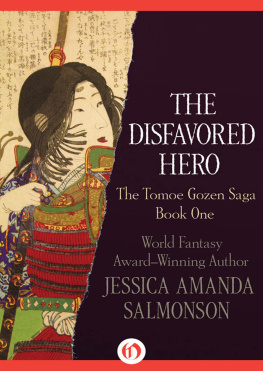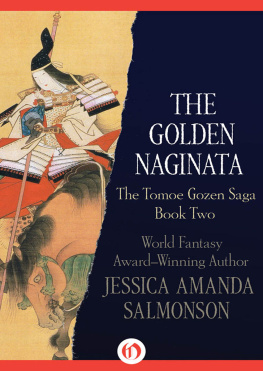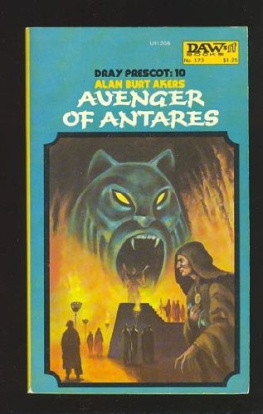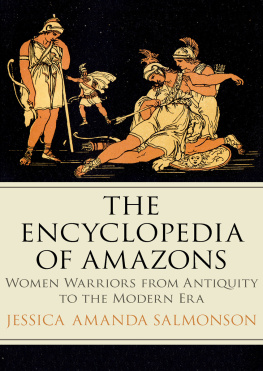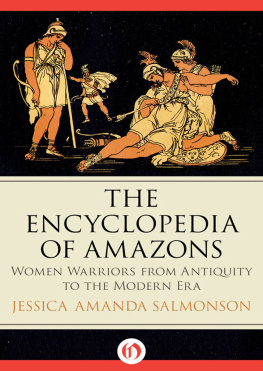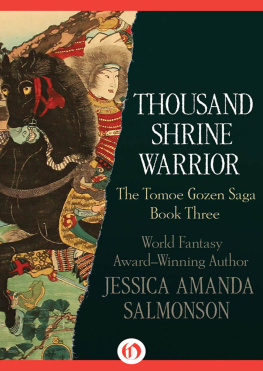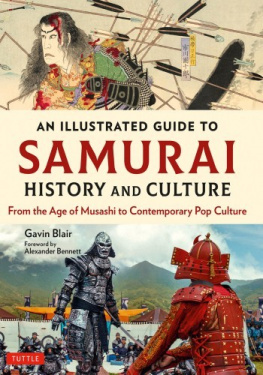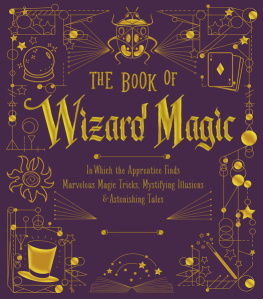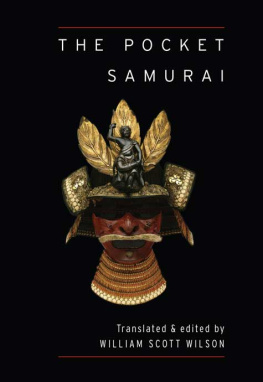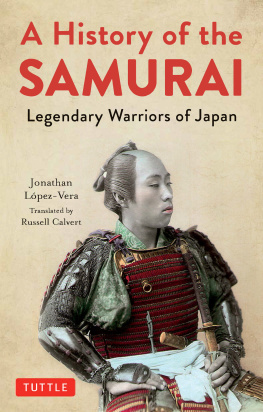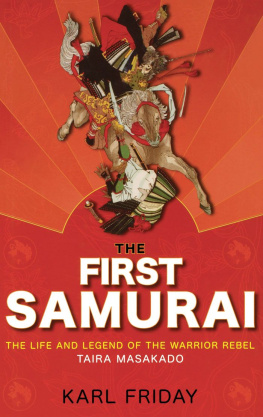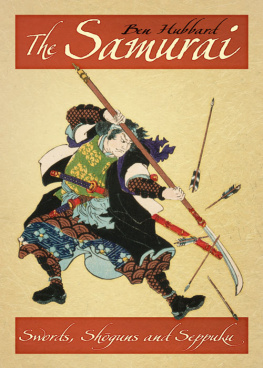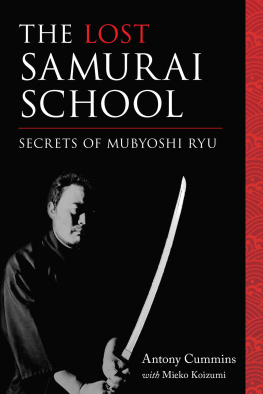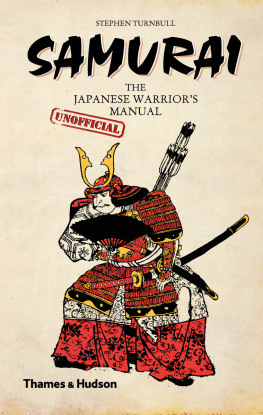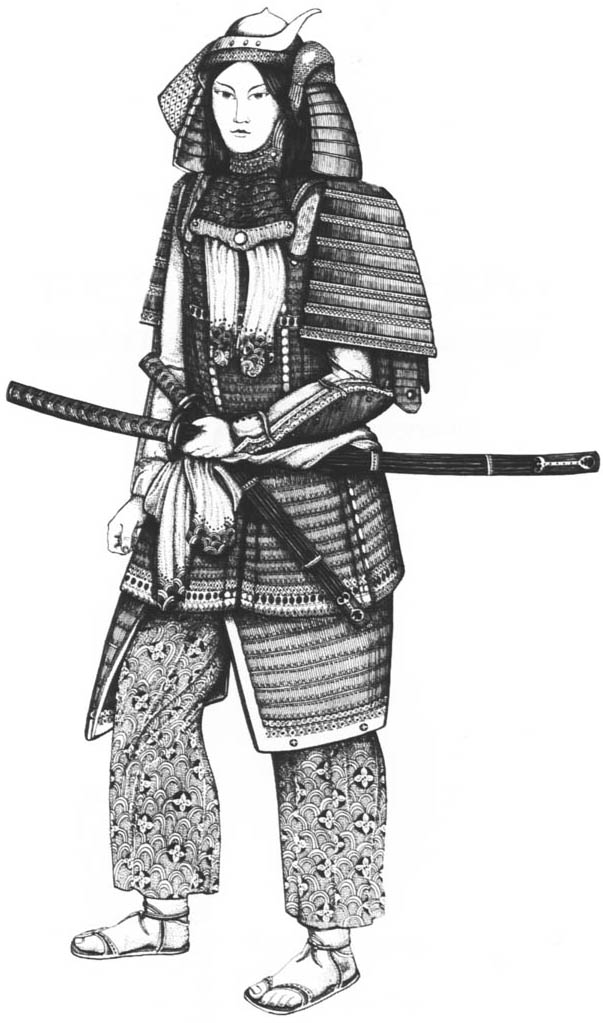The Disfavored Hero
The Tomoe Gozen Saga, Book One
Jessica Amanda Salmonson

in memoriam,
to Lumchuan Lek Salmonson
my Buddhist mother
I am coming to you, Lek,
on the river of manu colors
LIST OF ILLUSTRATIONS
by Wendy Adrian Wees
PROLOGUE:
The Magic Nation
On that island empire, as it is perceived in our own universe and which the West calls Japan and the East calls Nippon, millennia passed during which the pious honored a multitude of gods, despite that no one had ever seen a godling walk the Earth. Those same people believed in magnificent monsters; yet never had there been so much as a tibia of proof for this outlandish bestiary. These folk were also convinced of magic, although every miracle resolved into a trick or natural thing. And if a curse were delivered to a foe, it would be so devoutly believed that the cursed individual might curl up and die of painful imaginings; or the cursed ones family might make ready a grave in advance and grievously encourage the curse to work true, though all the while the fact was that no objective interference had occurred.
There would come a time, in Japan, when these discrepancies were noticed, and people would ask, If there are gods and demons and gigantic beasts, where do they hide? For the physics of the known universe left no hole in which might be encompassed the unknown. Godless people scoffed the vilest and most damning of curses, and were not surprised to pass unhindered, for words could never injure.
In those days, the edge of the sword had become the muzzle of a gun. Life which had once been bright like steel, and fearful, was no less fearful, but had become dull and small and leaden. Death, then, had no meaning; and if war was not more cruel, it was at least less holy.
In Japan, as in all the world of that terrible latter age, it would come to pass that wonder died.
But in a dimension next to ours, there is a world very much like Earth. On this world is an island empire called Naipon, which bears striking resemblance to old Japan; for Japan is a magic nation, existing in all human ages upon every Earth beneath Amaterasu the Shining Goddess. In that other worlds Japan called Naipon, gods scored the cities with their rakes when they were angered, and if they were pleased, pissed sak in the wells and rivers and excreted gold in the farmers furrows. On Naipon, beasts slew mighty samurai with claws and horns, or else their grim heads decorated the pikes of samurai who were mightier. Occult happenings were the meat of everyday life, and fell sorceries sprang from the fingertips of wicked villains. And most assuredly, you can well believe, a curse was never lightly spoken; for the fulfillment was not merely certain, but also rich with irony so that the curser, as well as the cursed, could meet unseemly ends.
On Naipon, it would never be, that wonder died.
Thus it is found out that things once believed by the people of Japan by rote of faith alone, they of Naipon witnessed absolutely. Even Amaterasu the Shining Goddess was unsure how this came to bewhether in Naipon the hopes and fears of Japan coalesced into a different and stranger reality, or if in Japan the glory and terror of Naipon echoed through the dreams of the Japanese.
PART I
The Way of the Warrior
In Naipon, as in the Japan of our own Earth, there lived a woman named Tomoe. She followed the bushido, or Way of the Warrior, and only once in her life did she stray from these tenets. This is the story of how sorcery caused Tomoe Gozen to break faith with her bushido, and what she did to regain honor.
Ushii pushed his kneeling friend off balance, causing Madoka to drop the shoulder armor he was attaching to himself. Youre not nice! complained Madoka, then moved his foot quickly to unsettle Ushii in turn. Tomoe Gozen shook her head and passed a momentary smile to the rooms fourth occupant, a severe and powerful man named Goro Maki. Goros eyes glinted, even though he did not return the smile. They are like little boys, said Tomoe. She suppressed laughter when Ushii slapped Madoka alongside the face in playful test of reflexes.
Goro Maki answered Tomoe in his resonant, intense voice: They have been together since military school, since they were six or seven. I envy them their love.
They were childlike only when together, away from the eyes of servants or lords. Other times, Ushii Yakushiji and Madoka Kawayama were nearly as serious as Goro Maki.
These four samuraithree men and one womanwent through the grooming rituals and ritual of applying their own armor piece by piece. Goro and Tomoe, by not being rowdy, completed these processes first. They sat on their knees, with hands at rest on the upper part of their legs, watching Ushii and Madoka behave whimsically. The hilt of a shortsword protruded from the center of Goros obi belt, and his longsword lay at his side on the floor. Two similarly paired long and shortswords waited on their horizontal racks near a wall. Tomoes two swords were of an uncommon design, both of equal length, and sheathed one at each hip rather than through her obi. Goros head turned until his gaze settled on these swords. Tomoe noticed his lack of appreciation.
You still think these will cause me trouble, my friend?
Goro looked mountainous on his knees. He visibly shrank in upon himself over Tomoes minor challenge. Then he replied in a harsh, measured tone, You have killed warriors as strong as me for doubting the metal of swords forged on foreign ground. It is not for Goro Maki to say Tomoe Gozen has changed since returning from the Celestial Kingdoms of Ho.
You are too formal, said Tomoe, her mood still pleasant. Please be more blunt. If you doubt I should wear foreign blades when we take new oaths of vassalage to our warlord, do not hesitate to criticize.
Your swords are very good, said Goro, but his growling intonation suggested otherwise. Do not tease me as Ushii does Madoka; I am too proudtoo proud to die by a sword not made in Naipon.
Tomoe was stung. No one had ever dared to say they would be ashamed to die by her swords, although as Goro stated, she had killed those who thought her style and weapons inferior. She did not press the matter further with Goro. He was a stickler about warrior codes; he would never fully approve of her alien steel, even if it were true that the swordsmith in Ho had been Naiponese born.
They were butterfly-longswords, wrought by a smith outcast from Naipon. Tomoe had traveled to Ho two years previous and assassinated the Naiponese traitor who served foreign strengths, who made for others swords with edge and temper intended by the gods for samurai alone. It had been a special mission performed under guidance of a messenger of the Mikado. She had been directed to find and destroy every bastard sword of Naipon craft and foreign design. She warred against the nefarious mainlanders with effective haste and completed her mission; but they had left their mark upon her by route of their variant and seductive philosophy. For the samurais sword is the samurais soul; and the second sword was always a short one which could never violate the longsword as true soul. The shortsword was considered guardian of the soul. Contrary to this norm, Tomoes blades were mirror images of one another, defying any to guess which bore her soul.

